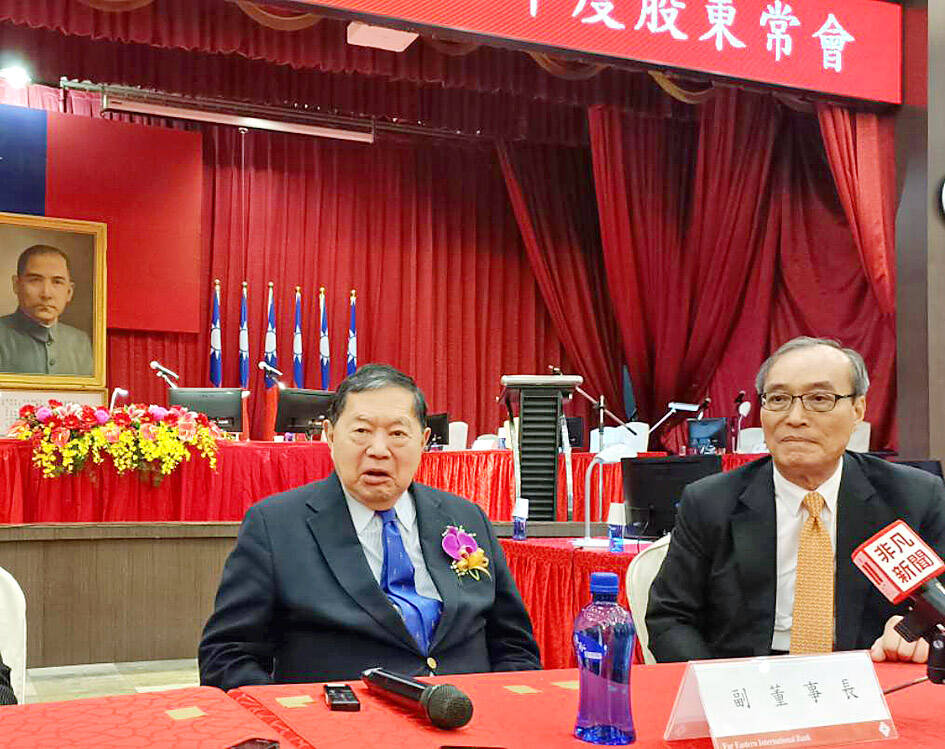Far Eastern International Bank (FEIB, 遠東國際商銀) yesterday said it is targeting loan growth of 4 percent this year, and has set a medium to long-term goal of transforming into a financial holding company.
The lender said it expects its financial performance this year to outpace average sector growth, driven by interest and fee income and investment gains.
The company discussed the goals during its annual general meeting, with shareholders approving plans to distribute a cash dividend of NT$0.506 and stock dividend of NT$0.506 per share, which translate into a payout ratio of 98 percent based on last year’s record income of NT$4.17 billion (US$128.87 million).

Photo: Lee Chin-hui, Taipei Times
“It is difficult to set a timetable for transforming into a financial holding company, as we have to seek merger and acquisition opportunities, which are beyond the bank’s control,” FEIB president Thomas Chou (周添財) told reporters.
The bank’s total assets last year rose 7 percent to NT$792.5 billion and it had a net worth of NT$58.9 billion, meeting the entry requirement of NT$750 billion for a financial conglomerate.
At the same time, its bad loan ratio declined to 0.108 percent, implying healthy assets.
Profitability gained momentum this year, with pretax profit in the first quarter surging 46 percent from a year earlier to NT$1.24 billion, company data showed.
FEIB attributed the profit improvement to less volatility in the bond market and investment gains.
Like its peers, the bank would press ahead with digital transformation and make online transactions its core operations, as technology reshapes the industry, Chou said.
Online savings accounts last year soared 78 percent and made up 2 percent of overall deposits, the bank said, adding that the proportion rose to 3.5 percent in March.
FEIB’s digital platform offers one-stop services and applications to facilitate deposits and lending, and enhance customer satisfaction, company representatives said.
Digital services aided the 24 percent rise in fee income in the first three months of this year from a year earlier.
The lender also places great importance on corporate banking and drove its cross-border syndicated loans to more than NT$77 billion last year, company officials said.
In other news, EnTie Bank (安泰銀行) shareholders yesterday approved a plan to distribute a cash dividend of NT$0.38 per share based on last year’s profit of NT$1.1 billion, or earnings per share of NT$0.56.
EnTie Bank said it took pride in boosting its green financing last year by 6.7 percent to NT$10.6 billion in support of efforts to address global warming.
It said it would seek to stay profitable and competitive for the rest of this year while meeting its social responsibility.

NEW IDENTITY: Known for its software, India has expanded into hardware, with its semiconductor industry growing from US$38bn in 2023 to US$45bn to US$50bn India on Saturday inaugurated its first semiconductor assembly and test facility, a milestone in the government’s push to reduce dependence on foreign chipmakers and stake a claim in a sector dominated by China. Indian Prime Minister Narendra Modi opened US firm Micron Technology Inc’s semiconductor assembly, test and packaging unit in his home state of Gujarat, hailing the “dawn of a new era” for India’s technology ambitions. “When young Indians look back in the future, they will see this decade as the turning point in our tech future,” Modi told the event, which was broadcast on his YouTube channel. The plant would convert

‘SEISMIC SHIFT’: The researcher forecast there would be about 1.1 billion mobile shipments this year, down from 1.26 billion the prior year and erasing years of gains The global smartphone market is expected to contract 12.9 percent this year due to the unprecedented memorychip shortage, marking “a crisis like no other,” researcher International Data Corp (IDC) said. The new forecast, a dramatic revision down from earlier estimates, gives the latest accounting of the ongoing memory crunch that is affecting every corner of the electronics industry. The demand for advanced memory to power artificial intelligence (AI) tasks has drained global supply until well into next year and jeopardizes the business model of many smartphone makers. IDC forecast about 1.1 billion mobile shipments this year, down from 1.26 billion the prior

People stand in a Pokemon store in Tokyo on Thursday. One of the world highest-grossing franchises is celebrated its 30th anniversary yesterday.

Zimbabwe’s ban on raw lithium exports is forcing Chinese miners to rethink their strategy, speeding up plans to process the metal locally instead of shipping it to China’s vast rechargeable battery industry. The country is Africa’s largest lithium producer and has one of the world’s largest reserves, according to the US Geological Survey (USGS). Zimbabwe already banned the export of lithium ore in 2022 and last year announced it would halt exports of lithium concentrates from January next year. However, on Wednesday it imposed the ban with immediate effect, leaving unclear what the lithium mining sector would do in the